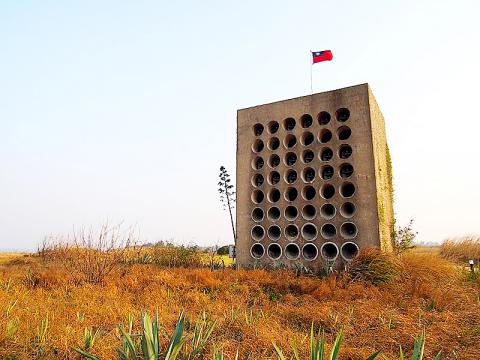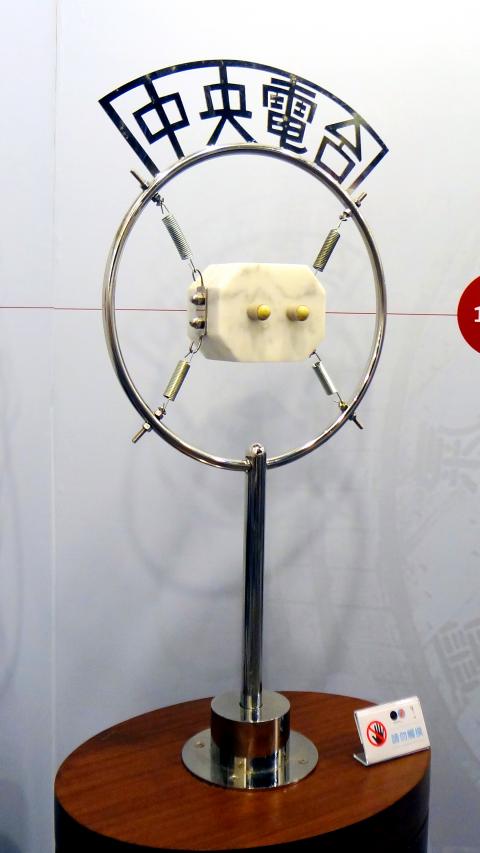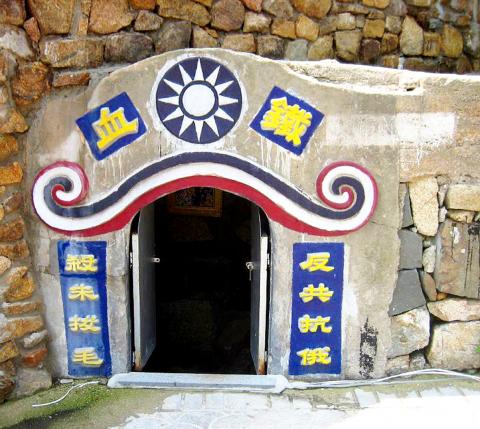JUNE 10 to JUNE 16
With programs such as Taiwan’s Advancements and Every Road Leads to Freedom, the Matsu Broadcasting Station (馬祖廣播電台) commenced its daily broadcasts toward the coast of China’s Fujian Province on June 15, 1959.
At the ribbon-cutting ceremony, then-political warfare bureau chief Chiang Chien-jen (蔣堅忍) announced the station’s objectives: to provide entertainment to the soldiers stationed on the tiny island off the coast of China and to “broadcast the voice of justice and freedom to sway the hearts of our compatriots on the mainland.”

Photo courtesy of Wikimedia Commons
According to the Chronicle of Lianjiang County (連江縣誌), that year the station broadcast 1,872 hours of propaganda, leading to 53 communist defections.
Although Taiwan had been broadcasting propaganda to China since 1949, the station’s establishment was part of a nationwide effort in 1959 to ramp up its psychological warfare operations. In Matsu, this included upgrading the existing loudspeakers and setting up a facility to send balloons containing propaganda messages.
TURNING THE ENEMY

Photo courtesy of Wikimedia Commons
The 1960s official booklet Radio Psychological Warfare (廣播心戰) details the spirit behind such propaganda broadcasts.
Its introduction reads: “The 700 million people on the mainland are our compatriots, and most of them are potential revolutionary forces who are determined to oppose Mao [Zedong (毛澤東)] and communism. We should show them our concern instead of reprimanding them; comfort them instead of aggravating them; cheer them on instead of bringing them down. We need to repeatedly reassure them that, ‘President Chiang [Kai-shek (蔣介石)] will definitely return and save our suffering compatriots.’”
In May 1954, the Central Broadcasting System’s (中央廣播電台) China division was upgraded to department status, with a psychological warfare team of 80-odd members from various institutions, including a number of former Chinese Communist Party (CCP) soldiers who chose to come to Taiwan after the Korean War.

Photo courtesy of Wikimedia Commons
The department laid out 10 principles, which entailed destroying communism with freedom, dignity and Chinese Nationalist Party (KMT) founder Sun Yat-sen’s (孫逸仙) Three Principles of the People (三民主義). Long-term themes included “the advancement and growth of Free China,” “traditional Chinese culture and morals,” examining “the crimes of the CCP’s violent rule” and “persuading youth to renounce communism.”
With American support, the broadcasts reached as far as Tibet, with programming in Mandarin, Cantonese, Hoklo, Hakka, Shanghainese, Tibetan, Mongolian, Uighur and Russian.
The booklet states that “despite the strict postal censorship by the CCP, our listeners in China are willing to risk their lives to send us mail.” Most of the mail in 1967 came from coastal areas in China’s Guangdong and Fujian provinces, sent by young intellectuals and CCP officials.
“Eighty percent of the letters consist of reports on anti-communist activity. They want to establish contact and receive our support, and most importantly they want us to provide them with missions… The rest are accusations of CCP violence, various intel and requests for aid.”
While the CCP was commonly referred to as “communist bandits” in Taiwan, the broadcasts used neutral or friendly terms instead, leading some domestic listeners to accuse the government of trying to be chummy with the enemy.
But as Wang Lung-hua (汪隆華) writes in a 1969 “Study of Taiwan’s Psychological Warfare Broadcasts Toward the Mainland” (台灣地區對大陸心戰廣播之研究): “If there’s a group of bandits in front of you, and you want to destroy them without suffering any losses, what do you do? The only way is to persuade them to change their ways. To do that, you can’t call them bandits to their faces.”
FRONTLINE PROPAGANDA
After another upgrade in 1966, the Matsu Broadcasting Station was capable of reaching the provinces of Sichuan, Hunan and Shaanxi in China.
Back then, the Golden Bell Awards (金鐘獎) had a “Programs Targeting the Mainland” category for such propaganda programs, with subcategories for news, political analysis, variety entertainment and special programs. Matsu’s station claimed two trophies over the years for original programming that was “firm in its stance.”
It was not an easy task to be a broadcaster on the frontlines in isolated Matsu, especially as a female, but it seemed to have been a prestigious position for which many vied. Almost 300 young women applied for the job in 1972, with only three making the cut. Over the next few years, the station added local broadcasters, since the Matsu dialect was very similar to that spoken in Fuzhou City in China’s Fujian Province.
With the advent of television and the defusing of cross-strait tensions, the radio station’s staff dwindled over the years. By 1980, it no longer had a production team, instead relaying programs from the main stations in Taiwan. The station finally closed down in June 1991, a month after then-president Lee Teng-hui (李登輝) terminated the period of national mobilization for the suppression of communist rebellion.
Taiwan in Time, a column about Taiwan’s history that is published every Sunday, spotlights important or interesting events around the nation that have anniversaries this week.

Jacques Poissant’s suffering stopped the day he asked his daughter if it would be “cowardly to ask to be helped to die.” The retired Canadian insurance adviser was 93, and “was wasting away” after a long battle with prostate cancer. “He no longer had any zest for life,” Josee Poissant said. Last year her mother made the same choice at 96 when she realized she would not be getting out of hospital. She died surrounded by her children and their partners listening to the music she loved. “She was at peace. She sang until she went to sleep.” Josee Poissant remembers it as a beautiful

For many centuries from the medieval to the early modern era, the island port of Hirado on the northwestern tip of Kyushu in Japan was the epicenter of piracy in East Asia. From bases in Hirado the notorious wokou (倭寇) terrorized Korea and China. They raided coastal towns, carrying off people into slavery and looting everything from grain to porcelain to bells in Buddhist temples. Kyushu itself operated a thriving trade with China in sulfur, a necessary ingredient of the gunpowder that powered militaries from Europe to Japan. Over time Hirado developed into a full service stop for pirates. Booty could

Before the last section of the round-the-island railway was electrified, one old blue train still chugged back and forth between Pingtung County’s Fangliao (枋寮) and Taitung (台東) stations once a day. It was so slow, was so hot (it had no air conditioning) and covered such a short distance, that the low fare still failed to attract many riders. This relic of the past was finally retired when the South Link Line was fully electrified on Dec. 23, 2020. A wave of nostalgia surrounded the termination of the Ordinary Train service, as these train carriages had been in use for decades

Lori Sepich smoked for years and sometimes skipped taking her blood pressure medicine. But she never thought she’d have a heart attack. The possibility “just wasn’t registering with me,” said the 64-year-old from Memphis, Tennessee, who suffered two of them 13 years apart. She’s far from alone. More than 60 million women in the US live with cardiovascular disease, which includes heart disease as well as stroke, heart failure and atrial fibrillation. And despite the myth that heart attacks mostly strike men, women are vulnerable too. Overall in the US, 1 in 5 women dies of cardiovascular disease each year, 37,000 of them